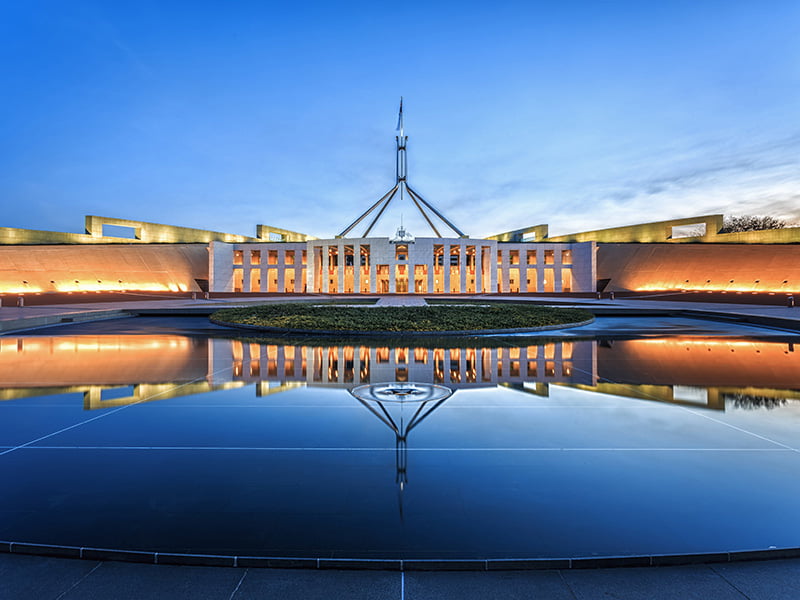I am forced to live in two parallel worlds. One world is served by an expensive and unreliable NBN where on the weekend in Canberra the speed was 18Mbps down / 23Mbps up. The other world is AI, where for free, I have access to Google’s AI services and compete globally and largely unhindered during the pandemic.
So I don’t believe that the ACCC digital platforms inquiry and the Senate Committee hearings into the proposed News Media and Digital Platforms Mandatory Bargaining Code is actually about the news.
The debacle unfolding is in reality a dangerous episode of a government and bureaucracy blind-sided by legacy industries and unprepared for the digital era that is upon us.

Credit: DavidWebb/Shutterstock
In years to come, students of history will discover the treasure trove of submissions to the Senate Committee and wonder who actually read them. They will wonder why the submissions of Sir Tim Berners-Lee (“in my capacity as the inventor of the World Wide Web”) and Vint Cerf (“I am one of the original co-designers of the Internet”) appear to have been ignored.
Fermenting in this miasma are three fundamentally specious assumptions / positions with the proposed Code and related digital advertising inquiry.
Firstly, the analogy of platforms is an industrial age concept and its use as an analogy in these inquiries to shape analysis of digital economy concepts, is flawed. Radically, the economy and our lives are shaped by ecosystems of domains – such as the Apple ecosystem and the Google ecosystem – directly servicing and informing individual consumers.
Recent research by MIT Centre for Information Systems Research (CISR) “Hello Domains, Goodbye Industries”, examines a fundamental economic shift to domains brought about by digital technologies and ecosystem business models.
In the flawed ‘platforms’ analogy, the comparison to utilities and industrial age concepts of ‘supply chains’ has created a pyramid of false and incomplete analysis upon which the ‘power imbalance’ theory rests, and the policy and draft legislation is built.
ACCC industrial era references to the Google supply chain and its ‘opacity’, reveals a defective understanding of the dynamics of new emerging domains and ecosystems of services.
This defective understanding is also evidenced by the flawed methodology of the Digital and Advertising Services Inquiry, which was based on an analysis of websites frequently visited by consumers in Australia.
Curiously, this would appear to put out of scope, the economically massive online games industry expected to reach $300 billion by 2025 with over 3 billion gamers. This is a sector that the Australian Government has consistently ignored for more than a decade.
The eGames and online gaming innovations and technologies are radically reshaping entire economies and servicing industries. This is why Apple and Fortnite are locked in battle.
Two in three Australians use video games. People are in their apps throughout the day: while commuting; relaxing; engaging in health, education, entertainment and news. The roll out of 5G is enabling a superior gaming experience. These behaviours are fundamentally different to the website visit modelling assumptions of the inquiry.
According to Venturebeat, “…by the end of 2019, 120 billion apps were downloaded worldwide, 29.6 billion of which were games…and in-game ad revenue is predicted to grow faster than direct spending in the next few years with spend estimated to be $35 billion by 2024.”
So if we’re looking to the future to understand the dynamics of advertising and news, an inquiry that excludes gaming – but for some reason is transfixed by the industrial age paradigm of websites, platforms and supply chains – is utterly flawed.
Secondly, the apparent lack of ethics in the proposal, is a concerning indication that what is at stake is not understood. That the creators of the Internet and World Wide Web have both written to the Committee explaining how search and links work, detailing the threat the draft legislation poses for an open web, is extraordinary.
Amongst the ethical issues not explored are the consequences of the recommendations (even if these are implementable) regarding notification of algorithmic changes and data silos.
The bureaucracy simply has neither the capability nor capacity to evaluate and safeguard such complex and economically significant algorithms. Robodebt is an horrific example.
This is not just my view: public sector capability reviews over a decade or more have described consistently and in detail the technology capability deficit in government, notwithstanding the billions invested in systems.
Similarly, the mandatory data silo recommendation in the Code is vacuous. It is incongruous that the government would seek to impose a data architecture (data silo) strategy on commercial organisations, when the government itself is trying to do the opposite in its DTA-led digital transformation strategy to break down the silos.
‘Data silos’ do not inherently protect privacy or mitigate risk. The rearchitecting of businesses into silos may very well cause additional handling of personal information. But it is also not necessarily the case that silo busting leads to a better customer experience.
What has to be clearly articulated, is purpose, strategy and governance: not a knee-jerk imposition of a poorly understood solution that has neither been examined in detail nor tested.
Indeed, in describing the fundamental economic change that is occurring as the emergence of the domains, the MIT CSIR research talks about a mind-shift and breaking down the silos to make it easier for the customer to create their own value.
And with the advice of Sir Tim Berners-Lee in hand, the government should look further into the future of the web that he is leading. Berners-Lee takes a different view of silos: and that is not for the big tech companies themselves to construct further data silos as proposed by the government, but to give individuals more power.
He is doing this via his new open-source initiative called Inrupt and the development of technology standards to enable individuals to control their own data.
As with the emergence of domains and ecosystems, Berners-Lee’s work on the future of the web is a fundamental paradigm shift. But two decades of policy failure has left Australia ill-equipped to face this digital future: ranking 44 (out of 63 nations) on digital/technological skills and 54 in communications technology in the 2020 IMD World Digital Competitiveness Rankings.
Thirdly, in targeting Google and Facebook, the Australian government sleepwalks into trade war territory. The submissions from the US Government (Executive Office of the President) and the US Chamber of Commerce raise concerns about the explicit and exclusive targeting of US companies without first having established a violation.
According to the US, “…the proposal violates the non-discrimination obligations to which Australia has undertaken in the Australia-United States Free Trade Agreement and the World Trade Organisation’s General Agreement on Trade in Services.”
Back in 2005, I was awarded an O-Visa (Individuals with Extraordinary Ability) by the US Government to take up my worldwide government role with Microsoft in Seattle, so I personally understand the fierce competition for talent, and appreciate the high stakes of market protection by the US government.
The stakes are unfathomably higher in the digital era: for global citizens and global companies alike.
Trade concerns were also raised by the Software & Information Industry Association (SIIA) regarding “the discriminatory treatment of US firms because it effectively targets two U.S. companies”.
The SIIA is the leading organisation representing financial information, education technology, specialised content and publishing companies (that in many cases make their content available behind a paywall), and health technology companies and associations.
Similarly, the Business Council of Australia noted that if the Code were implemented, it would create “substantial sovereign risk” for companies looking to operate or invest in Australia.
What would a digital trade war look like? Under the proposed Code, the Australian government can add any other company. The Internet Association emphasises this point: “The Code grants unfettered discretionary powers to the Treasurer without proscribing clear standards or principles for designating which companies the Code will apply to.”
My business, like many others in Australia, use the Google, Apple and Microsoft ecosystems of domains for different purposes. And with geo-blocking, the features and services we rely on could be stopped, delayed or limited either in retaliation or because of the increased legal and commercial risk to these overseas companies.
In the Google ecosystem, we use Gmail, Chrome, YouTube, Google Search. We use the free Google Dialogue Flow AI conversational system. Geo-blocking of any of these would significantly impact our ability to undertake R&D and compete globally in AI.
We are also and for different purposes, deeply integrated into the Apple ecosystem devices, wearables and apps – including Apple Health. And Apple News, for which we do pay a subscription, part of which flows to the media outlets creating the content.
We confidently and continuously share our health data with Apple and this has literally been a life saver for heart patient husband Allan Johnson. We have never had this level of confidence nor benefit from the My Health Record.
A digital trade war might see the Australian government continue its wait-and-see approach to the approval of the Apple Watch ECG and other critical heart health functions, even though these have been approved for use in the US, UK, Canada, New Zealand and 60 other countries. The health of many Australians is at risk from this argy-bargy.
And Microsoft’s statement this week that it has thrown its full support behind the government’s media bargaining Code is hardly the result of an afternoon discussion between the Prime Minister and Microsoft chief executive Satya Nadella.
Way back in 2009, The Guardian reported that News Corp was considering a tie-up with Microsoft against Google. Looks like Australia has been played as mugs in a power play of techno politics disguised as news.
The shrill responses from the government and the Senate committee that Australia will not be bullied and that “we decide” are a dog whistle to the doctrine of vested interests. Doctrine that over twenty years has seen the NBN debacle; the gutting of public sector capability through widespread outsourcing; leaving Australia languishing near the bottom of global digital competitiveness.
The world is watching, not just because of the potential threat to Google’s business model, but to see how apparently easily the fundamentals of the open web and the digital economy can be compromised by a democratic government appealing to rusted on vested interests and a bureaucracy struggling in the digital era.
Do you know more? Contact James Riley via Email.


Excellent piece.